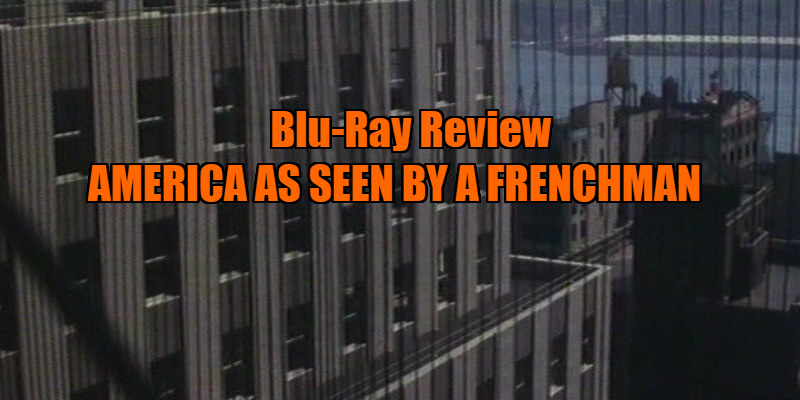
Review by Eric Hillis
Directed by: François Reichenbach

We Europeans enjoy a curious relationship with the United States of America. On one hand we're beguiled by its size, the length of its vast uninterrupted highways and the height of its burgers; by its musical amalgamations of European and African traditions; and by its movies and TV. On the other we view the country with something approaching parental scorn as we watch it make the sort of mistakes our societies made centuries ago, and we enjoy feeling morally superior to our American cousins - no matter how messed up our societies get, America will always be there to outdo us; no matter what sort of narcissist we elect, there will always be someone worse in the Whitehouse. But in recent decades Europe and America have begun to resemble one another, for better or worse, and we now worry not that Americans are in danger of repeating our mistakes, but that we might be only a decade or two away from emulating theirs.

60 years ago however, when a French crew led by director François Reichenbach left to document the length and breadth of America, the US might as well have existed on another planet. While Europe was still wheeling away the literal and figurative rubble of World War II, Americans were embracing life in that exuberant, chest-thumping way only a nation that has never known occupation can. While devastated European cities resembled the stone age, America was ushering in the space age - a TV in practically every living room; refrigerators bigger than Parisian apartments; cars wider than most Roman streets, some equipped with their own refrigerators. But also mass incarceration, racial segregation, and an increasingly militaristic culture that paraded its might down main street at every opportunity to show the world America was ready for a fight.
[ READ MORE: New Release Review - You Don't Nomi ]
Following an intro by Jean Cocteau, Reichenbach arrives, not as you might expect in New York, but on the west coast. The first object of fascination for his camera is San Francisco's Golden Gate bridge, but he quickly turns his attention to people, and it's America's people that holds his film's attention for most of its course.

Reichenbach's camera takes in the sort of oddities that prompt one to exclaim "Only in America!", none more bizarre than a rodeo tournament in which the riders are prisoners competing to have their sentences reduced. There's a convention for twins, a striptease school and the then racially segregated New Orleans Mardi Gras. We see children stuff mountains of ice cream into their messy maws, spin hula hoops around their waists while their older brothers and sisters cavort on beaches, revelling in the world's first culture designed to cater for youth.
[ READ MORE: New Release Review - The Uncertain Kingdom ]
In this way, America As Seen by a Frenchman is a precursor to the 'Mondo' documentary craze that would soon follow in the '60s, but its focus is not on sex or barbarism, but mostly on the many ways a society with a disposable income keeps itself occupied. The camera may be impartial but the narration, co-written by Chris Marker, is at times biting, making it clear that Reichenbach isn't entirely sold on the American way of life. It's ironic that a movie made 60 years ago should make such a point of observing how obsessed Americans are with their screens. At one point the narrator talks about how America produces so many tourists, but that they "travel the world without ever looking at it," so pre-occupied are they with taking pictures for posterity. In a segment concerning new-born children observed by CCTV cameras, a wry jibe is directed at how Americans spend their first few days being watched by television, and the rest of their lives returning the favour. Elsewhere the Gallic digs are more subtle, like how a small town parade is described as "inevitable." You can just imagine Reichenbach's crew, 18 months into their endeavour, exasperated at the idea of having to endure more bloody pageantry. Michel Legrand's jazz and blues inflected scores similarly pays tribute to American culture while mocking it.

The images captured by said crew are often as beautiful as they are baffling. Viewed on Arrow Academy's glorious blu-ray transfer, the film looks as though it were shot yesterday, as if we're watching some sort of cosplay recreation of mid 20th century America. But one thing tells us that this is indeed an America of a lost era - not the size of its natural and man-made constructs, but of its people, whose slim physiques have yet to bear the brunt of those mountains of ice cream.

Extras:
New video appreciation of the film by author and critic Philip Kemp; image gallery; collector's booklet featuring new writing by critic Caspar Salmon.

America As Seen by a Frenchman is on blu-ray now from Arrow Academy.
"Represents a return to form for Atom Egoyan while reaffirming David Thewlis as one of the most under-rated actors of his generation."— The Movie Waffler (@themoviewaffler) June 5, 2020
GUEST OF HONOUR is on Curzon Home Cinema now.
Read @hilliseric's reviewhttps://t.co/yQTo0z8rZV pic.twitter.com/yyqeqD65dS
